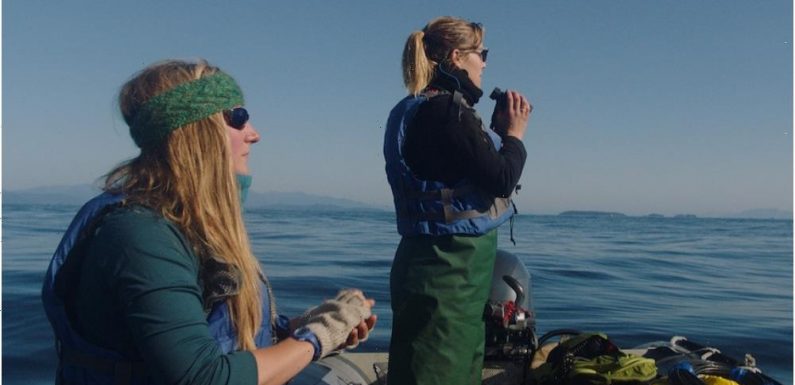
Documentary filmmaker Drew Xanthopoulos started reading about whale cognition, culture and communication around four years ago, and was blown away by what he found.
“It was stranger than any science fiction I’d ever read or watched on the screen,” Xanthopoulos says. “It occurred to me that if I’m having this much of an emotional effect from reading about the science, surely the people who are out there on boats for months and months doing the work, it must be profound for them.”
So he started attending whale research conferences, where he met Michelle Fournet (pictured above right) and Ellen Garland, the subjects of his latest documentary “Fathom.” The film follows the two researchers out into the field as the former attempts to have a conversation with humpback whales, while the latter pieces together how whale song travels across vast swathes of ocean.
Variety caught up with Xanthopoulos ahead of the film’s U.K. theatrical premiere at the Edinburgh International Film Festival (it already launched on Apple TV Plus) to discuss the vital conversation “Fathom” sparks about women in STEM (Science, Technology, Engineering and Mathematics), and what the future holds for him and the whale researchers he documented.
How did you settle on Fournet and Garland as your protagonists?
I wanted to focus on scientists who are doing excellent science, who were asking profound questions that I thought had big implications for audiences. Also they had to be scientists who went out to sea for long periods of time. I wanted someone who, in order to try and wrap their head around a different kind of consciousness, had to leave everything that made them them behind for months at a time: Their family, their home, their pets. That personal transformation interested me. There was a third factor which is you really have to like the person. You’re going to hang out in the most vulnerable circumstances. I first met Michelle and then Ellen afterwards, and it seemed like their research was really complementary to one another. One was studying one sound produced by humpback whales, and the other was trying to figure out the global scale of how whale songs are shared.
Talk about incorporating the more human moments out in the field. It can’t just be 90 minutes of boat research shots, right?
At the end of the day, it’s all in service to the person; you’re trying to do justice to their process and their life and their story. This film is a tribute to what it means to be a field researcher. With that comes tedium, comes repetition, comes really hard work and scary moments. But also, the exhilaration of letting some steam off with your teammates. The hope was that with the way the film is structured, you get a sense that those lighter moments are an exhalation after holding your breath for so long for things to work out after planning so hard. Structurally, that’s the balance the film is trying to strike.
How important was it to include conversations about women in STEM?
Very. I hope those conversations might change something. You could have research grants that have built-in line item budgets for child care while someone’s away. There are ways for institutions to be supportive, but it’s more a question of why aren’t they supporting young professionals who also want to have families and spouses? The larger issue is why are we having to sacrifice all this? Is that really necessary, do we really have to leave everything behind? Or is it because the institutions that fund these things have only the work as their priority, not the life part of doing research?
What are Ellen and Michelle working on next?
Pending funding opportunities, they would like to collaborate with one another. There are some things that they could explore together, one of them is looking at whoop calls within song, which is something that no-one has had a chance to analyze.
And how about you?
I have been reading and researching a lot. I’m at this nascent stage where I can’t tell if I’m reading for pleasure or if I’m actually researching the next film, which is a good place because that’s where “Fathom” was four years ago. It will be a branch off the same tree as “Fathom,” interested in the same themes of trying to take ideas that we’ve clung to so firmly, that we feel makes us unique and different, and trying to subvert them a little bit. I think the responsibility of art is to expand how we see ourselves in relation to everything else, not narrow it down.
Source: Read Full Article